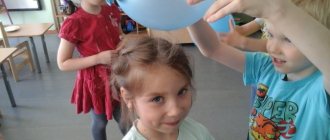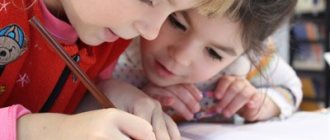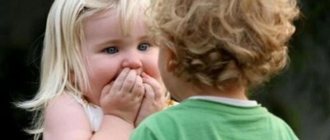“Social formation of the personality of a preschooler”
Social formation of the personality of a preschooler.
Every person is able to anticipate the reactions of others and control his actions according to the actions that he attributes to them.
How does a child develop into a value-oriented person who, although different from everyone else, is able to act in accordance with them?
Socialization refers to those processes through which people learn to participate effectively in social groups. The acquisition of these skills is associated with childhood. The driving force behind the social development of the individual is learning, communication and various types of joint activities. Education arouses interest in life in a child, awakens and sets in motion internal development processes. The child acquires social experience through learning, imitation, communication and activity.
The process of socialization is the inclusion of a child in the society of adults and peers.
Preschool age is the most important stage in a child’s development. It is that period of a person’s life when they are introduced to the world of universal human values, the time when they establish first relationships with people, and enter society.
A preschooler perceives the world around him not quite the way adults see and understand him. Due to little life experience, the peculiarities of the development of thinking processes and imagination, the child sees the social world in his own way.
During the process of socialization, a person takes on various roles. The game occupies a major place in developmental technologies that ensure the process of socialization. The period of preschool childhood is most favorable for the formation of socially significant personality traits. The process of socialization of a preschool child occurs in certain conditions.
Surrounded by objects of material and spiritual culture, people and relationships between them. The main sources of socialization of a preschooler are the family and kindergarten.
A set of activities aimed at the social development of children, formed through familiarization with universal human values and culture, consists of three areas.
1. Developmental and educational space
Subject-spatial environment: organization of play space; recreation areas, privacy, corners for developing children's abilities, individual symbols on children's lockers, in the group there is a gallery of family photos. The presence of information and computer technologies will help ensure visibility not just of abstract situations, but also provide the child with the opportunity to see, hear and evaluate actions “live”.
Social environment: understanding of the child by adults, trust and respect between children and adults; at joint events, group cohesion, cooperation between an adult and a child, recognition of the child’s individual rights.
2. Developmental and correctional work.
With children: social events; psychological and pedagogical activities for children’s adaptation to kindergarten, targeted and thematic walks, excursions, developing games of social competence.
With parents: visiting families, family holidays and leisure, joint design of conditions for the development of the child in the family.
3. Psychodiagnostics - drawing up a social portrait of a child.
Educator: observations, filling out a questionnaire to determine the level of development of children’s communication abilities.
Parents: creative essay about the achievements and development of children’s abilities while visiting a preschool institution, questionnaire.
The essence of social and personal development of a preschooler
Definition 1
Social and personal development is the formation of a child’s correct attitude towards himself and the environment, as well as his social motives and needs.
In accordance with the Federal State Educational Standard for Additional Education, social and personal development is included in the educational area “Social and communicative development” and is aimed at:
- children’s assimilation of values and norms accepted in modern society;
- formation and development of communication skills through active interaction of the child with peers and adults;
- formation of skills of independence, self-education, self-regulation and direction of one’s actions;
- development of emotional and social intelligence, empathy and emotional responsiveness (empathy);
- formation of readiness to carry out joint activities with peers;
- formation of respect for the surrounding people, the Motherland, history and traditions of the people;
- developing pride and a sense of belonging to one’s family, nationality and community;
- formation of a positive attitude towards various types of labor and creative activities;
- formation of the foundations for safe behavior in everyday life, society and nature.
Are you an expert in this subject area? We invite you to become the author of the Directory Working Conditions
Within the preschool educational institution, the social and personal development of preschool children is carried out in the following forms:
- educational activities;
- joint activities of the teacher and children;
- joint activities of pupils;
- individual types of work of a teacher with children.
Currently, modern kindergartens pay great attention to solving the problem of social and personal development of preschool children. This is due to the fact that it is aimed at shaping the child’s attitude towards the world around him and himself, contributes to the development of social needs and motives, and the formation of self-knowledge. Social and personal development requires a considerable amount of labor from the teacher and the manifestation of pedagogical professionalism, which contributes to obtaining a visible result.
Means of social education for preschool children
The preschool period is a period of time that is optimal for the development of moral and communicative qualities. The child communicates with everyone in his environment. His activities gradually become more complex, he establishes contacts with peers in order to participate in the game. Social education comes down to creating pedagogical conditions that allow for the comprehensive development of a person’s personality. The spiritual and value orientation of a small individual must be positive.
The means for social education are:
- play activities;
- communication;
- organizing conversations on various topics;
- discussion of children's actions;
- exercises for speech development and broadening horizons;
- reading.
The main activity at this age is role-playing games . While playing, the baby adopts the necessary behavior patterns. He performs certain actions, playing out a specific life situation. He is interested in how people build their relationships, he begins to think about the meaning of the work of adults. In games, kids try to accurately imitate behavior patterns seen in real life or in movies. Situation games allow you to play the role of mom or dad, waiter or businessman.
The formation of a person’s social essence is possible only in society. A.N. Ostrogorsky notes that play allows children to process impressions and knowledge from the world around them. Such activity is a valuable social practice for them.
Research conducted by V.P. Zalogina, R.I. Zhukovskaya and others proved that role-playing games are social in motives, functions and structure. The role of games in education in preschool age is significant.
Principles of child socialization
The main principles of organizing work on the educational line “Child in Society” are:
- the unity of the formation in children of ideas about social reality as part of the environment, which reflects the activities and relationships of people, and the education in children of a conscious desire to participate in the lives of the people who surround them;
- reliability and pedagogical expediency in the selection of knowledge about man, society, morality;
- the complexity of the use of various types of children’s activities in the formation of a humane attitude towards people;
- using the example of an adult as a bearer of knowledge, norms, values, and personal qualities.
The main task of implementing the educational line “Child in Society” is to reveal the social world to the child and help him gain social experience, understand his place in society as an active participant. In the process of individual mastery of the world, the child does not lose his own “I”, but, on the contrary, preserves, develops and enriches the content of his inner world.
A child is a social being. He is characterized by an acute specific need for something else. Therefore, any, even the simplest, child’s attitude towards the world around him is always refracted through his attitude towards another person. The very concept of “attitude” has subjective and objective aspects.
According to Lidia Bozhovich, only through studying the child’s attitude to reality and, first of all, to social reality is the path to studying his personality.
It is extremely important to develop in children:
- openness to the world of people as a personal need;
- social behavior skills;
- conscious attitude towards oneself as a free, independent person; to their responsibilities, which are determined by connections with other people;
- readiness to perceive social information;
- the ability to sympathize, empathize;
- the desire to know people, to do good, to act with dignity.
The preface to the Basic Component of Preschool Education states that interaction with other people is a unique type of child’s entry into society, which requires the ability to coordinate one’s interests, desires, and actions with other members of society.
At preschool age, the foundations of a child’s social competence are formed:
- the ability to understand another person, his mood, needs, behavioral characteristics;
- the ability to respect other people, help them, take care of them;
- choose appropriate situations of communication and joint activities.
A socially competent child is able to feel his place in the system of human relationships and behave appropriately.
The basic component of preschool education defines two preschooler competencies in relation to the social environment:
- family and household - familiarity with the norms and rules of family (family) cohabitation; ability to comply with them; the ability to maintain benevolent, friendly, trusting relationships within the family, to show care and love to relatives and close family members;
- social-communicative - familiarity with the various social roles of people (acquaintances, strangers; one's own, strangers, children, adults, women, men, girls, boys, young, elderly), with elementary social and morally ethical norms of interpersonal relationships, the ability to observe them in communication time.
The ability to interact with people around you: coordinate your actions and behavior with others; realize your place in the social environment; perceive yourself positively. The ability to empathize, sympathize, help others, choose appropriate methods of communication in various life situations.
The development of creative games with social themes requires special attention from the teacher, in which the child reflects his understanding of society, relationships between people, compliance with moral standards, and attitude towards social responsibilities. In work on the educational line “Child in Society”, creative play takes on special importance.
A specific feature of work on this educational line is that it is not limited to certain forms of educational work, place in the daily routine, or duration in time. Since the child constantly acquires social experience, along with the forms planned and prepared by the teacher, it is also worth using events that occur outside the plan.
A new toy, a flower has bloomed, a groupmate’s illness and his return to kindergarten, and many other events that arise outside the educational plan - all this can become the subject of social-emotional experience and comprehension by children.
Features of social development of children
Socialization implies the formation of an initial cultural base. By communicating, the baby learns life, obeying the rules. Now he will need to take into account not only his own desires, but also the interests of the other child. The environment can influence the developing personality. It is where education is carried out and the foundations of behavior are laid. This concept includes not just a picture of the world with household things, roads, trees, cars. It is impossible not to take into account people who are in constant interaction. The norms of behavior accepted in society must begin to be learned from childhood.
The influence of adults on raising a child is obvious. Children watch people's actions with interest. Each acquaintance brings an element of novelty into a child’s life. Adults shape his personality by influencing him directly or indirectly, for whom they act as role models. Relatives in the family demonstrate their knowledge, show clearly how to handle things and treat people.
The child’s task is to inherit what he sees, to copy for himself. The learned norms of behavior will allow him to successfully communicate with other children. Positive communication experiences influence children's emotional well-being. The preschool period is the time when personality begins to form. Education is a process that needs to be given time constantly. The attitudes that children receive and their behavior are interconnected. Moreover, it is not necessary that this connection immediately manifest itself clearly.



